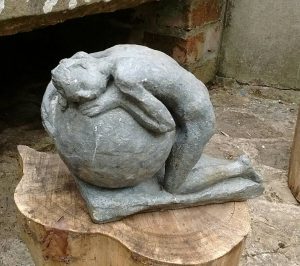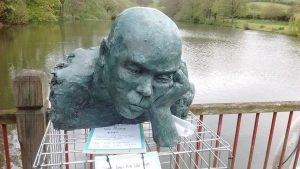This Week’s Bit of String: Dinner with the minister
Quite a few years ago we had dinner at a Southern Baptist pastor’s house. I’d met his family at a New England playground when our son was little, and as they’d recently arrived from South Carolina attempting to reform us heathen Yankees, they were very friendly and keen to get our kids together.
‘He’s a pastor,’ I informed my British husband before introducing him. ‘Just bear that in mind.’
During the meal, the two men chatted merrily. The minister asked my husband about his physics studies, and eventually followed up with, ‘So do you believe in evolution?’
My husband laughed, leaning back in his chair. ‘Well, I don’t know anyone who believes in creation!’
‘Ah do,’ drawled the pastor calmly.
‘Do you?’ my husband asked me, visibly shaken to his core.
I shrugged. I was raised to, certainly, but in the midst of all the other issues and debates raging through life, I’d never found that one to be a battle worth fighting.
Old Premise, New Ideas
Is it so very important where we come from? I mean, to an extent it is. There’s a lot to learn about more recent history (post-Big Bang or Creation or what have you) that better informs our view of the world and of humanity. But I bumble along in my explorations happily resigned to uncertainty regarding the world’s origin story.
On a mental level, I see the logic of the Big Bang Theory. But the creation story still fascinates me.

I’m working on a new novel, starring and told by Eve—‘mother of all the living.’ What would it be like, acting as the prototype for 50% of an entire species? How would she learn to be a woman when no other women were around (and not many men either)?
I’m scribbling the early chapters, as well as researching at the moment. I haven’t read a lot around this issue. I’m planning to read Paradise Lost, and look at the Apocrypha as well. So far, I just keep reading the first chapters of Genesis. And honestly, it’s intriguing.
I’m sure to many, the Biblical idea of Intelligent Design sounds overbearing and rigid. But each verse poses huge questions and leaves much to the imagination.
For example, after Eve and Adam took the forbidden fruit, God clothed them in animal skins. How? Was this the first animal slaughter? Could it, further, have been an animal they’d loved in that place of peace?
Eve is never named in that account until after being cursed by God and exiled from Eden. She’s called ‘the woman,’ or ‘Adam’s wife’ up till then. That’s cold. Why?
Then again, considering Adam’s name simply means man, and according to the story there were no other men or women around, I guess they wouldn’t have needed to call each other anything else.
Factual Truth Versus Character Truth
So I’m researching, and questioning, and daydreaming. Not because I intend to find out exactly what happened in the first days of earth, but because it’s fun to imagine.
Isn’t it, in a way, more exciting not to know or worry about whether a book’s premise is true? Hogwarts probably doesn’t exist, and when you think about it, a ring holding dominion over all Middle Earth is somewhat bizarre. But we love finding out how characters—people rather like us—might react in such inventive scenarios.

It’s not exactly difficult to imagine a woman breaking a rule—she’s sure she’s only bending it a little—in order to gain some equal footing. So what if it takes place in a garden paradise that’s just appeared out of nowhere, with angels strolling and demons lurking? I feel I can still inject plausibility into her plight.
I think there’s a vital difference between believing a book and believing in a book. It’s the difference between veracity and value; the hierarchical inferiority of situation to character. Aren’t we capable of savouring a protagonist’s authenticity without completely swallowing their circumstances?
I keep going back to this quote from Yann Martel’s eponymous character in Life of Pi: ‘If you stumble at mere believability, what are you living for? Isn’t love hard to believe?’
I’m not putting my trust in the words of Genesis. But it draws me in and I accept its story, the same way I accept a John Irving story or a Joanne Harris one. Fiction writers tell the truth of their characters, and I’m prepared to believe them. Tell me a character, Biblical or otherwise, did such-and-such: fine, I’ll play along. I’ll ponder why, and to what effect.
Do you find it necessary to establish the complete veracity of a book in order to get involved? What makes a story more or less believable—how happy are you to fill in the gaps?

